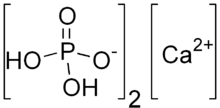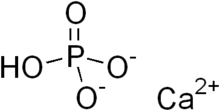Calcium phosphate



Calcium phosphate is the name given to a family of minerals containing calcium ions (Ca2+) together with orthophosphates (PO43−), metaphosphates or pyrophosphates (P2O74−) and occasionally hydrogen or hydroxide ions.[1]
Calcium phosphate is the principal form of calcium found in bovine milk and blood. Seventy percent of bone consists of hydroxyapatite, a calcium phosphate mineral (known as bone mineral). Tooth enamel is composed of almost ninety percent hydroxyapatite.
Chemical properties
Unlike most other compounds, the solubility level of calcium phosphate becomes lower as temperature increases. Thus heating causes precipitation.
In milk it is found in higher concentrations than would be possible at the normal pH because it exists in a colloidal form in micelles bound to casein protein with magnesium, zinc and citrate - collectively referred to as colloidal calcium phosphate (CCP).[2]
It is used in the production of phosphoric acid and fertilizers, for example in the Odda process. Overuse of certain forms of calcium phosphate can lead to nutrient-containing surface runoff and subsequent adverse effects upon receiving waters such as algal blooms and eutrophication.
Calcium phosphate is used in baking as the acid in a leavening agent, with E number E341. It is also used in cheese products.
A supersaturated calcium phosphate solution such as Caphosol may be used in the prevention and treatment of oral mucositis caused by chemotherapy or radiotherapy.
Tricalcium phosphate is also used as a nutritional supplement[3] and occurs naturally in cow milk , although the most common and economical forms for calcium supplementation are calcium carbonate (which should be taken with food) and calcium citrate (which can be taken without food).[4] There have been limited studies on the use of Hydroxyapatite as a food supplement, as such, its usage is discouraged.[4]
It is used in a variety of dental products for remineralization and as a diluent in some medications where it will give the tablet a grey colour in the absence of additional colouring agents.[5]
Another practical application of the compound is its use in gene transfection of cells.[6] It is not too well understood, but the calcium phosphate precipitate and DNA form a complex that is thought to help the DNA enter the cell.
It is also being used in the development of contrast agents.[7]
Calcium phosphates
- Monocalcium phosphate, E341(i): Ca(H2PO4)2
- Dicalcium phosphate (dibasic calcium phosphate), E341(ii): CaHPO4
- Tricalcium phosphate (tribasic calcium phosphate or tricalcic phosphate), E341(iii): Ca3(PO4)2, sometimes referred to simply as calcium phosphate or calcium orthophosphate
- Hydroxyapatite Ca5(PO4)3(OH)
- Apatite Ca10(PO4)6(OH, F, Cl, Br)2
- Octacalcium phosphate Ca8H2(PO4)6.5H2O
- Biphasic calcium phosphate (not to be confused with dibasic calcium phosphate) is a biomaterial that is biphasic, consisting of a mixture of tricalcium phosphate and hydroxyapatite. It is an alternative to bone grafting that is used around osseous implants (such as dental implants). It gradually resorbs and becomes substituted by new vital bone (via bone regeneration).
- Tetracalcium phosphate, Ca4(PO4)2O
- Amorphous calcium phosphate, a glassy precipitate of variable composition that may be present in biological systems.
Compendial status
See also
References
- ↑ "What Is Calcium Phosphate?".
- ↑ A. Y. Tamime, ed. (2006). Brined cheeses - The Society of Dairy Technology (SDT). Wiley-Blackwell. ISBN 978-1-4051-2460-7.
- ↑ Bonjour JP, Carrie AL, Ferrari S, Clavien H, Slosman D, Theintz G, Rizzoli R (March 1997). "Calcium-enriched foods and bone mass growth in prepubertal girls: a randomized, double-blind, placebo-controlled trial". J. Clin. Invest. 99 (6): 1287–94. doi:10.1172/JCI119287. PMC 507944
 . PMID 9077538.
. PMID 9077538. - 1 2 Straub DA (June 2007). "Calcium supplementation in clinical practice: a review of forms, doses, and indications". Nutr Clin Pract. 22 (3): 286–96. doi:10.1177/0115426507022003286. PMID 17507729.
- ↑ Weiner, Myra L.; Lois A. Kotkoskie (1999). Excipient Toxicity and Safety. p. 81. ISBN 978-0-8247-8210-8.
- ↑ Kingston RE, Chen CA, Rose JK (August 2003). "Calcium phosphate transfection". Curr Protoc Mol Biol. Chapter 9: Unit 9.1. doi:10.1002/0471142727.mb0901s63. ISBN 0-471-14272-7. PMID 18265332.
|chapter=ignored (help) - ↑ Ashokan, A; Gowd, GS; Somasundaram, VH; Bhupathi, A; Peethambaran, R; Unni, AK; Palaniswamy, S; Nair, SV; Koyakutty, M (Sep 2013). "Multifunctional calcium phosphate nano-contrast agent for combined nuclear, magnetic and near-infrared in vivo imaging". Biomaterials. 34 (29): 7143–57. doi:10.1016/j.biomaterials.2013.05.077.
- ↑ British Pharmacopoeia Commission Secretariat (2009). "Index, BP 2009" (PDF). Archived from the original (PDF) on 11 April 2009. Retrieved 31 January 2010.